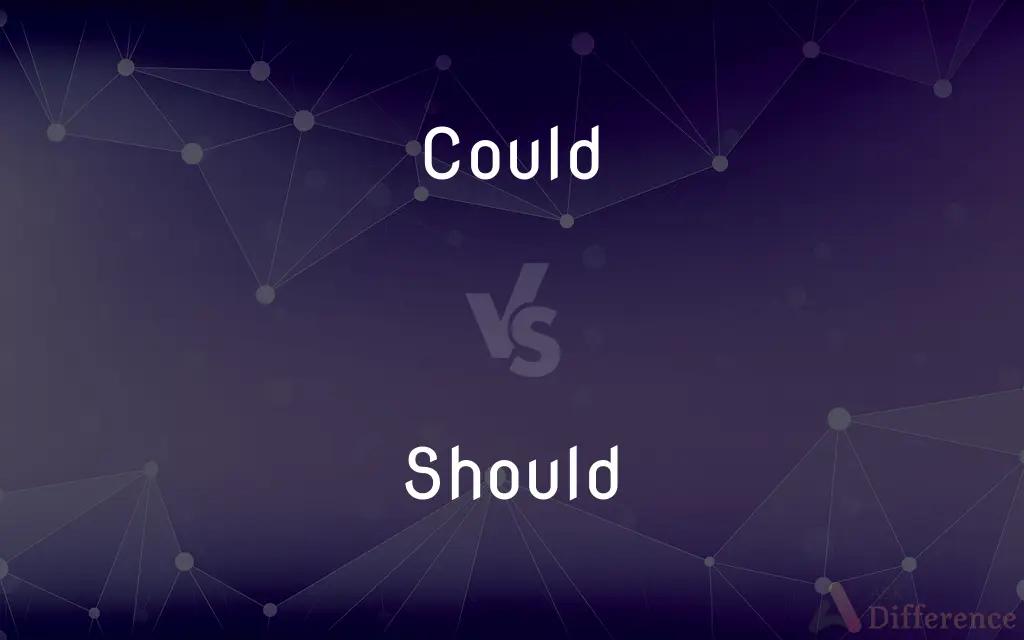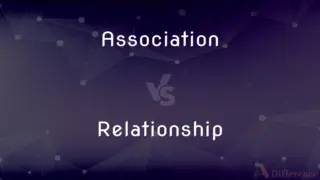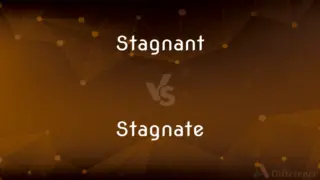Could vs. Should — What's the Difference?
Edited by Tayyaba Rehman — By Fiza Rafique — Updated on March 20, 2024
"Could" implies possibility or ability in the past or hypothetical scenarios, while "should" suggests advice, obligation, or expectation.

Difference Between Could and Should
Table of Contents
ADVERTISEMENT
Key Differences
"Could" is used to express possibility, ability, or permission in the past or hypothetical situations. For instance, when someone says, "I could go to the party," it indicates they have the option or ability to attend. On the other hand, "should" is used to express advice, recommendations, or obligations. When someone says, "You should go to the party," it implies a suggestion or advice based on the speaker's opinion.
"Could" also indicates a past ability or possibility. For example, "I could swim when I was younger," reflects an ability the speaker had in the past. Whereas "should" can indicate a past recommendation or advice that was not followed, as in, "You should have attended the party," suggesting a missed recommendation.
In questions, "could" is used to make polite requests or inquire about possibilities, such as "Could you pass the salt?" This usage is more about seeking permission or exploring an option politely. Conversely, "should" in questions often seeks advice or an opinion, e.g., "Should I wear this dress?" where the speaker is looking for a recommendation.
"Could" can be used to express a range of probabilities, from very likely to very unlikely situations, depending on the context. It introduces a speculative tone, as in "It could rain later." Whereas "should" often conveys a stronger expectation or likelihood of an event happening, as in, "It should rain later," based on weather forecasts or known information.
In conditional sentences, "could" is used to express potential outcomes of hypothetical situations, e.g., "If I won the lottery, I could buy a house." Here, "could" explores a hypothetical possibility. In contrast, "should" in conditional sentences can indicate what is expected or supposed to happen, e.g., "If you studied more, you should pass the exam," emphasizing an expected result based on a condition.
ADVERTISEMENT
Comparison Chart
Basic Use
Indicates possibility, ability, or permission.
Suggests advice, recommendation, or obligation.
Time Reference
Often refers to past abilities or hypothetical future scenarios.
Primarily used for present or future advice, also for past advice not taken.
Politeness in Requests
Used to make polite requests or inquiries about possibilities.
Not typically used for requests; used for seeking advice or giving suggestions.
Probability and Expectation
Can express a range of probabilities, from likely to unlikely.
Indicates a stronger expectation or likelihood of something happening.
Conditional Sentences
Used to express potential outcomes in hypothetical situations.
Used to indicate expected or supposed outcomes based on certain conditions.
Compare with Definitions
Could
Indicating past ability.
She could dance very well when she was younger.
Should
Giving advice.
You should try the new restaurant downtown.
Could
Speculating about the future.
We could meet for coffee next week.
Should
Expressing expectation.
The train should arrive by 5 PM.
Could
Making polite requests.
Could you help me with this?
Should
Indicating obligation.
You should finish your homework before going out.
Could
Expressing conditional outcomes.
If I saved enough, I could buy a car.
Should
Advising against something.
You shouldn't drink and drive.
Could
Expressing possibility.
I could see myself living in New York.
Should
Reflecting on missed actions.
I should have studied more for the exam.
Could
Past of can
Should
(auxiliary) Ought to; indicating opinion, advice, or instruction, about what is required or desirable.
Could
Inflection of can
Should
Used to issue an instruction (traditionally seen as carrying less force of authority than alternatives such as 'shall' or 'must').
You should never drink and drive.
The law is clear that you should always wear a seat belt.
The manual says that this switch should be in the 'off' position.
Could
Used as a past subjunctive (contrary to fact).
I think he could do it if he really wanted to.
I wish I could fly!
Should
Used to give advice or opinion that an action is, or would have been, beneficial or desirable.
You should go and see that film. I think you'll enjoy it.
I should exercise more often, but I’m too lazy.
She should not have been so rude.
Could
Used to politely ask for permission to do something.
Could I borrow your coat?
Should
(informal) With verbs such as 'see' or 'hear', usually in the second person, used to point out something remarkable in either a good or bad way.
You should see his new apartment. It's like a palace!
If you think her piano playing is bad, you should hear her sing!
Could
Used to politely ask for someone else to do something.
Could you proofread this email?
Should
In questions, asks what is correct, proper, desirable, etc.
What do you think? What should I do?
Could
Used to show the possibility that something might happen.
We could rearrange the time if you like.
Should
(auxiliary) Ought to; expressing expectation.
Could
Used to suggest something.
You could try adding more salt to the soup.
Should
Indicates that something is expected to have happened or to be the case now.
They should have finished by now; I'll call them to check.
My fruit trees should be in flower, but the cold spring has set them back.
Could
Past participle of can
Should
Will be likely to (become or do something); indicates a degree of possibility or probability that the stated thing will happen or be true in the future.
They should have it finished by Friday.
When you press this button, the pilot flame should ignite.
You should be warm enough with that coat.
Could
Something that could happen, or could be the case, under different circumstances; a potentiality.
Should
Used to form a variant of the present subjunctive, expressing a state or action that is hypothetical, potential, mandated, etc.
If I should be late, go without me.
Should you need extra blankets, you will find them in the closet.
The man demanded that he should be allowed entry.
I'm surprised that he should say that.
Could
Was, should be, or would be, able, capable, or susceptible. Used as an auxiliary, in the past tense or in the conditional present.
Should
(auxiliary) cap=1.
I told him that I should be busy tomorrow.
Should
(auxiliary) An alternative to would with first person subjects.
Should
Used to express a conditional outcome.
If I had not been so tired, I should have laughed heartily.
Should
Used to impart a tentative, conjectural or polite nuance.
I should imagine that they have arrived by now.
I should think you would apologize.
Should
Used to express what the speaker would do in another person's situation, as a means of giving a suggestion or recommendation.
It's disgraceful the way that they've treated you. I should write and complain.
Should
To make a statement of what ought to be true, as opposed to reality. en
Should
Something that ought to be the case as opposed to already being the case.
Should
Used as an auxiliary verb, to express a conditional or contingent act or state, or as a supposition of an actual fact; also, to express moral obligation (see Shall); e. g.: they should have come last week; if I should go; I should think you could go.
Common Curiosities
Is "could" used in polite requests?
Yes, "could" is commonly used to make requests sound more polite and tentative.
Can "could" express past abilities?
Yes, "could" often refers to abilities or possibilities that existed in the past.
Can "could" be used for hypothetical situations?
Yes, "could" is often used to discuss possibilities in hypothetical scenarios.
What is the difference between "could have" and "should have"?
"Could have" implies a missed possibility, while "should have" suggests regret over not following advice or doing something.
How is "should" used to give advice?
"Should" is used to suggest what is advisable or recommendable in a given situation.
How do "could" and "should" differ in conditional sentences?
"Could" expresses potential outcomes, while "should" indicates expected or supposed outcomes based on conditions.
How does "should" reflect on past actions?
"Should" can express regret or criticism over not having taken a recommended action in the past.
When is it appropriate to use "should" in a question?
When seeking advice or an opinion on what is considered best or advisable.
What does "could" indicate in a sentence?
"Could" indicates possibility, ability in the past, or a polite way to make requests.
What does it mean when someone says "you should"?
It means they are giving advice, suggesting an obligation, or indicating an expectation.
What makes "could" a choice for expressing speculation?
Its use in indicating a range of possibilities, from likely to unlikely, makes it suitable for speculation.
How does "should" express obligation?
"Should" implies that there is a duty, necessity, or correctness in performing an action.
Can "should" indicate a strong likelihood?
Yes, "should" can suggest that something is very likely to happen based on current evidence or norms.
Is "could" specific to past tense?
Not exclusively, but it is often used to refer to past abilities or hypothetical future possibilities.
Are "could" and "should" interchangeable?
No, their uses are distinct, focusing on possibility and advice/obligation, respectively.
Share Your Discovery

Previous Comparison
Association vs. Relationship
Next Comparison
Stagnant vs. StagnateAuthor Spotlight
Written by
Fiza RafiqueFiza Rafique is a skilled content writer at AskDifference.com, where she meticulously refines and enhances written pieces. Drawing from her vast editorial expertise, Fiza ensures clarity, accuracy, and precision in every article. Passionate about language, she continually seeks to elevate the quality of content for readers worldwide.
Edited by
Tayyaba RehmanTayyaba Rehman is a distinguished writer, currently serving as a primary contributor to askdifference.com. As a researcher in semantics and etymology, Tayyaba's passion for the complexity of languages and their distinctions has found a perfect home on the platform. Tayyaba delves into the intricacies of language, distinguishing between commonly confused words and phrases, thereby providing clarity for readers worldwide.
















































